|
Books Should Be Free Loyal Books Free Public Domain Audiobooks & eBook Downloads |
|
|
Books Should Be Free Loyal Books Free Public Domain Audiobooks & eBook Downloads |
|
Top Authors |
|---|
|
Book type:
Sort by:
|
By: Johann David Wyss (1743-1818) | |
|---|---|
 The Swiss Family Robinson
The Swiss Family Robinson
A beautiful story about survival, the Robinson family shows that one does not have to have the usual comforts of life in order to be comfortable and happy. It is also a story about family relations. The book showcases a family of six that has to start all over without the basic amenities that make life easier in the eyes of society. The idea of being in an island with no human neighbors is daunting to say the least. The family was shipwrecked and everyone else on the ship perished when they deserted the ship... | |
By: Oscar Wilde (1854-1900) | |
|---|---|
 The Picture of Dorian Gray
The Picture of Dorian Gray
A novel that disturbs you 160 years after it first appeared in print, The Picture of Dorian Gray by Oscar Wilde, has so much relevance and resonance even today. Dorian Gray is a strikingly handsome young man whose beauty attracts a debauched aristocrat Sir Henry Wotton. Dorian's picture has been painted by a talented artist Basil Hallward and Sir Henry becomes desperate to meet Dorian, though Basil himself is against it. Sir Henry persuades Dorian to pose for a picture painted by Basil and during the painting sessions, Henry “educates” the young and impressionable Dorian about life... | |
 Reviews
Reviews
Wilde’s literary reputation has survived so much that I think it proof against any exhumation of articles which he or his admirers would have preferred to forget. As a matter of fact, I believe this volume will prove of unusual interest; some of the reviews are curiously prophetic; some are, of course, biassed by prejudice hostile or friendly; others are conceived in the author’s wittiest and happiest vein; only a few are colourless. And if, according to Lord Beaconsfield, the verdict of a continental nation may be regarded as that of posterity, Wilde is a much greater force in our literature than even friendly contemporaries ever supposed he would become... | |
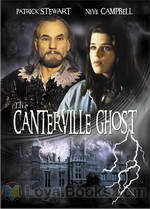 The Canterville Ghost
The Canterville Ghost
An American diplomat's family moves into an ancient stately mansion. They're warned by the owner that it is haunted by a most horrifying and gruesome spirit who had once cruelly murdered his own wife. The story progresses with creaking floor boards, mysterious passages, dark attics, clanking chains, and weird howling. Yet, the reader is totally unprepared for Oscar Wilde's brand of tongue in cheek humor as he takes all the ingredients of a traditional ghost story and turns it on its head, and creates a hilarious parody instead of a morbid saga! The Canterville Ghost was the first of Oscar Wilde's short stories to be published... | |
 The Importance of Being Earnest
The Importance of Being Earnest
A wealthy philanthropist adopts an abandoned baby he finds in a railway station waiting room. The child grows into a fine, upstanding young man. When his benefactor dies, he is made the guardian of the old man's lovely young daughter. But unknown to everyone, he leads a double life that even his best friend knows nothing about... If you thought that this has all the makings of a most sinister and diabolical plot, you couldn't be more mistaken. The Importance of Being Earnest by Oscar Wilde is a light as a feather confection, full of mischief, fun and laughter! Written in 1894, this was Wilde's last play... | |
 An Ideal Husband
An Ideal Husband
This story opens at a fashionable dinner party in Sir Robert Chiltern's home in the heart of London's stylish Grosvenor Square. One of Lady Chiltern's old school-friends, Mrs. Cheveley, a woman with a dubious past, accosts Sir Robert and threatens to expose a financial crime that he had once participated in, unless he agrees to finance a fraudulent construction project that she's promoting. Lady Chiltern is astounded when her husband who had been the severest critic of this project suddenly begins to speak in its favor... | |
 The Happy Prince and Other Tales
The Happy Prince and Other Tales
The Happy Prince and Other Tales (also sometimes called The Happy Prince and Other Stories) is an 1888 collection of stories for children by Oscar Wilde. It is most famous for The Happy Prince, the short tale of a metal statue who befriends a migratory bird. Together, they bring happiness to others, in life as well as in death. The stories included in this collection are:The Happy PrinceThe Nightingale and the RoseThe Selfish GiantThe Devoted FriendThe Remarkable RocketThe stories convey an appreciation for the exotic, the sensual and for masculine beauty. | |
 De Profundis
De Profundis
This is a letter written from prison in 1897 by Oscar Wilde to Lord Alfred Douglas, in which he recounts how he came to be in prison and charts his spiritual development. | |
 Lady Windermere's Fan
Lady Windermere's Fan
Lady Windermere’s Fan: A Play About a Good Woman is a four act comedy by Oscar Wilde, published in 1893. As in some of his other comedies, Wilde satirizes the morals of Victorian society, and attitudes between the sexes. The action centres around a fan given to Lady Windermere as a present by her husband, and the ball held that evening to celebrate her 21st birthday. | |
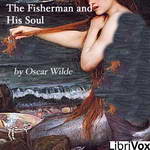 The Fisherman and His Soul
The Fisherman and His Soul
”The Fisherman and his Soul” is a fairy tale first published in November of 1891 in Wilde’s “A House of Pomegranates”. It tells of a fisherman who nets and falls in love with a mermaid. But to be with her he must shed his soul, which goes off to have adventures of its own. Will forbidden love endure? | |
 The Ballad of Reading Gaol
The Ballad of Reading Gaol
In 1895, Oscar Wilde was sentenced to 2 years of hard labor for acts of ‘gross indecency’. During his time at Reading Gaol, he witnessed a rare hanging, and in the three years between his release and his untimely death in 1900, was inspired to write the following poem, a meditation on the death penalty and the importance of forgiveness, even for (and especially for) something as heinous as murdering one’s spouse; for even the murderer, Wilde argues, is human and suffers more so for being the cause of his own pain, for ‘having killed the thing he loved’; for everyone is the cause of someone else’s suffering and suffers at the hands of another... | |
 The Soul of Man
The Soul of Man
“(T)he past is what man should not have been. The present is what man ought not to be. The future is what artists are.”Published originally as “The Soul of Man Under Socialism,” this is not so much a work of sober political analysis; rather it can be summed up as a rhapsodic manifesto on behalf of the Individual. Socialism having deployed technology to liberate the whole of humanity from soul-destroying labour, the State obligingly withers away to allow the free development of a joyful, anarchic hedonism... | |
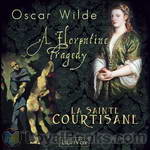 A Florentine Tragedy and La Sainte Courtisane
A Florentine Tragedy and La Sainte Courtisane
Two short fragments: an unfinished and a lost play. A Florentine Tragedy, left in a taxi (not a handbag), is Wilde’s most successful attempt at tragedy – intense and domestic, with surprising depth of characterisation. It was adapted into an opera by the Austrian composer Alexander Zemlinsky in 1917. La Sainte Courtisane, or The Woman Covered in Jewels explores one of Wilde’s great idées fixes: the paradox of religious hedonism, pagan piety. Both plays, Wildean to their core, revel in the profound sadness that is the fruit of the conflict between fidelity and forbidden love... | |
 A Woman of No Importance
A Woman of No Importance
A Woman of No Importance is a play by Irish playwright Oscar Wilde. The play premièred on 19 April 1893 at London's Haymarket Theatre. It is a testimony of Wilde's wit and his brand of dark comedy. It looks in particular at English upper class society and has been reproduced on stages in Europe and North America since his death in 1900. | |
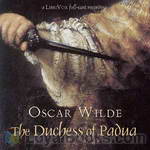 The Duchess of Padua
The Duchess of Padua
Guido Ferranti, a young man, travels to Padua with his friend Ascanio after receiving a mysterious letter from a stranger, claiming to know the true secret of Guido's birth. His plan of revenge goes awry, however, when he falls in love with his enemy's beautiful wife, the Duchess of Padua. | |
 Intentions
Intentions
| |
 Essays and Lectures
Essays and Lectures
| |
 Lord Arthur Savile's Crime and Other Stories
Lord Arthur Savile's Crime and Other Stories
Lord Arthur Savile's Crime and Other Stories is a collection of short semi-comic mystery stories. This collection exemplifies Wilde's sharp wit and dark humour. Stories in this collection include Lord Arthur Savile's Crime, The Canterville Ghost, The Sphinx Without a Secret, The Model Millionaire, and The Portrait Of Mr W H. | |
 Selected Prose of Oscar Wilde
Selected Prose of Oscar Wilde
| |
 Miscellaneous Aphorisms; The Soul of Man
Miscellaneous Aphorisms; The Soul of Man
| |
 Miscellanies
Miscellanies
| |
 Vera; or the Nihilists
Vera; or the Nihilists
Vera; or, The Nihilists is a play by Oscar Wilde. It is a melodramatic tragedy set in Russia and is loosely based on the story of Vera Zasulich. It was the first play that Wilde wrote. It was produced in the United Kingdom in 1880, and in New York in 1882, but it was not a success and folded in both cities. It is nowadays rarely revived. | |
 Shorter Prose Pieces
Shorter Prose Pieces
| |
 For Love of the King a Burmese Masque
For Love of the King a Burmese Masque
| |
 A Critic in Pall Mall Being Extracts from Reviews and Miscellanies
A Critic in Pall Mall Being Extracts from Reviews and Miscellanies
| |
By: Herman Melville (1819-1891) | |
|---|---|
 Moby Dick
Moby Dick
“Call me Ishmael” is one of the most famous opening lines in American literature. With these words, opens one of the strangest and most gripping stories ever written about the sea and sea-faring. Moby Dick by Herman Melville is today considered one of the greatest novels written in America but paradoxically, it was a miserable failure when it first made its debut in 1851. Entitled Moby Dick or The Whale the book finally got its due after the author's death and is now regarded as a classic portrayal of mania and fatal obsession... | |
 Typee
Typee
A whaling ship stops at a remote Polynesian island. The crew aboard is exhausted after a grueling six-month voyage in which they suffered ill-treatment and drudgery. Two men decide to abandon ship and hide on the island, living off the fruit of the land, until they can get on board a more conducive ship. However, to their consternation they discover that part of the island paradise is peopled by a savage and cannibalistic tribe called the Typees. As destiny would have it, they fall into the hands of the very people they dread... | |
 Bartleby, the Scrivener
Bartleby, the Scrivener
Bartleby, the Scrivener: A Story of Wall Street is a novella by the American novelist Herman Melville (1819–1891). It first appeared anonymously in two parts in the November and December 1853 editions of Putnam's Magazine, and was reprinted with minor textual alterations in his The Piazza Tales in 1856. | |
 The Confidence-Man: His Masquerade
The Confidence-Man: His Masquerade
The Confidence-Man: His Masquerade was the last major novel by Herman Melville, the American writer and author of Moby-Dick. Published on April 1, 1857 (presumably the exact day of the novel's setting), The Confidence-Man was Melville's tenth major work in eleven years. The novel portrays a Canterbury Tales-style group of steamboat passengers whose interlocking stories are told as they travel down the Mississippi River toward New Orleans. The novel is written as cultural satire, allegory, and metaphysical treatise, dealing with themes of sincerity, identity, morality, religiosity, economic materialism, irony, and cynicism... | |
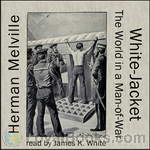 White Jacket, or The World in a Man-of-War
White Jacket, or The World in a Man-of-War
This is a tale based on Melville's experiences aboard the USS United States from 1843 to 1844. It comments on the harsh and brutal realities of service in the US Navy at that time, but beyond this the narrator has created for the reader graphic symbols for class distinction, segregation and slavery aboard this microcosm of the world, the USS Neversink. (Introduction by James K. White) | |
 The Encantadas, Or Enchanted Isles
The Encantadas, Or Enchanted Isles
The Encantadas or Enchanted Isles is a novella by American author Herman Melville. First published in Putnam's Magazine in 1854, it consists of ten philosophical "Sketches" on the Encantadas, or Galápagos Islands. It was collected in The Piazza Tales in 1856. The Encantadas was to become the most critically successful of that collection. All of the stories are replete with symbolism reinforcing the cruelty of life on the Encantadas. (Introduction excerpted from Wikipedia) | |
 Omoo
Omoo
| |
 Battle-Pieces and Aspects of the War
Battle-Pieces and Aspects of the War
| |
 Redburn: His First Voyage
Redburn: His First Voyage
Melville wrote of some of his earliest experiences at sea in the story of Wellingborough Redburn, a wet-behind-the-ears youngster whose head was filled with dreams of foreign travel and adventure. In Redburn, the protagonist enlists for a stint as a seaman aboard Highlander, a merchant ship running between New York and London. As with many of Melville's works, this one is as much about class and race as it is about the sea. | |
 Israel Potter
Israel Potter
| |
 Mardi: and A Voyage Thither
Mardi: and A Voyage Thither
| |
 I and My Chimney
I and My Chimney
| |
 John Marr and Other Poems
John Marr and Other Poems
| |
By: G. K. Chesterton (1874-1936) | |
|---|---|
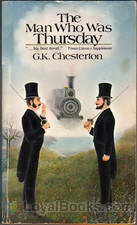 The Man Who was Thursday
The Man Who was Thursday
Two poets in a London park at sunset, debating on the attributes of poetry and whether it's really a metaphor for anarchy. A group that meets in secret, planning to overthrow the world order. Disguises and deceptions, ideals and ideology. A medley of themes and genres makes this a great read for anyone who's a fan of Chesterton and his iconic Father Brown. The Man Who Was Thursday includes Chesterton's favorite theme of Christianity with touches of delightful humor to enliven the twists and turns that abound throughout the book... | |
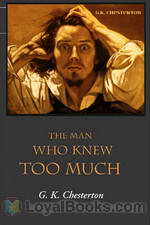 The Man Who Knew Too Much
The Man Who Knew Too Much
Robbery, murder and treason. Strange happenings in quiet English villages. A book critic who happens to find a corpse with its head crushed, an Irish freedom fighter framed for a crime, the disappearance of a valuable coin, a strange dispute over a property claim and a host of other intriguing situations make up the contents of G K Chesterton's collection of short stories The Man Who Knew Too Much. For fans of Chesterton's immortal clerical sleuth, Father Brown, these stories are equally delightful and intricately wrought... | |
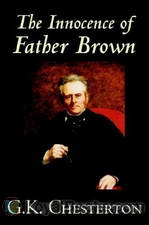 The Innocence of Father Brown
The Innocence of Father Brown
A Chief of Police hosts a dinner party for an American millionaire wishing to will his entire fortune to the Church of France. Jewels that have been stolen and recovered so many times that they're known colloquially by thieves as The Flying Stars. A murder committed by an invisible man. These and many others are the mysteries that are presented to the lovable, bumbling, stumpy Man of God, Father Brown. The Innocence of Father Brown, by G.K. Chesterton is a collection of eleven stories which marks the debut of this most unusual detective... | |
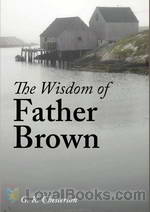 The Wisdom of Father Brown
The Wisdom of Father Brown
The Wisdom of Father Brown explores many characters and fascinating themes such as the following. An eminent criminologist is persuaded by the mild yet persistent Father Brown to sort out a family matter. Also, a Tuscan poet fancies himself as the King of Thieves. A famous French philosopher and atheist holds the key to a new invention called “Noiseless Powder.” A corpse is discovered in a dark passage backstage at London's Adelphi Theater. Finally there is Psychometric testing of criminals in Chicago... | |
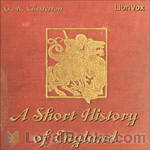 A Short History of England
A Short History of England
Gilbert Keith Chesterton was a prolific writer on many topics. His views of history were always from the standpoint of men and their interactions, and it may fairly be said he saw all of history as a battle between civilization and barbarism. So it has always been, and that remains true even today.“But it is especially in the matter of the Middle Ages that the popular histories trample upon the popular traditions. In this respect there is an almost comic contrast between the general information... | |
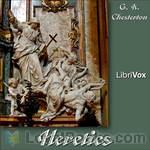 Heretics
Heretics
The Author Gilbert Keith Chesterton was born in London, England on the 29th of May, 1874. Though he considered himself a mere “rollicking journalist,” he was actually a prolific and gifted writer in virtually every area of literature. A man of strong opinions and enormously talented at defending them, his exuberant personality nevertheless allowed him to maintain warm friendships with people–such as George Bernard Shaw and H. G. Wells–with whom he vehemently disagreed. Chesterton had no difficulty standing up for what he believed... | |
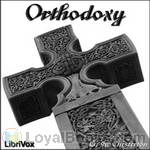 Orthodoxy
Orthodoxy
Orthodoxy is a book that has become a classic of Christian apologetics. In the book's preface Chesterton states the purpose is to "attempt an explanation, not of whether the Christian faith can be believed, but of how he personally has come to believe it." In it, Chesterton presents an original view of the Christian religion. He sees it as the answer to natural human needs, the "answer to a riddle" in his own words, and not simply as an arbitrary truth received from somewhere outside the boundaries of human experience. | |
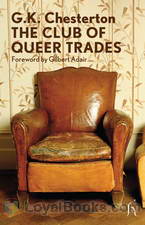 The Club of Queer Trades
The Club of Queer Trades
A collection of six wonderfully quirky detective stories, featuring the ‘mystic’ former judge Basil Grant. Each story reveals a practitioner of an entirely new profession, and member of the Club of Queer Trades. | |
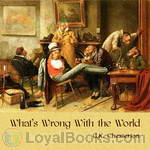 What's Wrong With the World
What's Wrong With the World
Gilbert Keith Chesterton (1874–1936) has been called the “prince of paradox.” Time magazine observed of his writing style: “Whenever possible Chesterton made his points with popular sayings, proverbs, allegories—first carefully turning them inside out.” His prolific and diverse output included journalism, philosophy, poetry, biography, Christian apologetics, fantasy and detective fiction. The title of Chesteron’s 1910 collection of essays was inspired by a title given to him two years earlier by The Times newspaper, which had asked a number of authors to write on the topic: “What’s wrong with the world?”... | |
 Eugenics and Other Evils
Eugenics and Other Evils
Most Eugenists are Euphemists. I mean merely that short words startle them, while long words soothe them. And they are utterly incapable of translating the one into the other, however obviously they mean the same thing. Say to them “The persuasive and even coercive powers of the citizen should enable him to make sure that the burden of longevity in the previous generation does not become disproportionate and intolerable, especially to the females”; say this to them and they will sway slightly to and fro like babies sent to sleep in cradles. Say to them “Murder your mother,” and they sit up quite suddenly. Yet the two sentences, in cold logic, are exactly the same.” | |
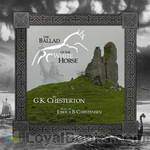 The Ballad of the White Horse
The Ballad of the White Horse
An English epic poem that follows the exploits of Alfred the Great in his defense of Christian civilization in England from the heathen nihilism of the North. Following a string of defeats at the hands of the invading Danes, a vision from heaven in the river island of Athelney fills Alfred with joy and hope. Though it gives no promise of victory in the coming struggle, it inspires him to rally his chieftains for a last stand against the invading hordes. His adventures lead throughout the country... | |
 Alarms and Discursions
Alarms and Discursions
Gilbert Keith Chesterton was an influential English writer of the early 20th century. His prolific and diverse output included journalism, philosophy, poetry, biography, Christian apologetics, fantasy, and detective fiction. Chesterton has been called the “prince of paradox.” He wrote in an off-hand, whimsical prose studded with startling formulations. Chesterton wrote about 4000 essays on various subjects, and “Ararms and Discursions is one of his collections. | |
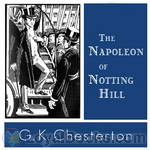 The Napoleon of Notting Hill
The Napoleon of Notting Hill
While the novel is humorous (one instance has the King sitting on top of an omnibus and speaking to it as to a horse: “Forward, my beauty, my Arab,” he said, patting the omnibus encouragingly, “fleetest of all thy bounding tribe”), it is also an adventure story: Chesterton is not afraid to let blood be drawn in his battles, fought with sword and halberd in the London streets, and Wayne thinks up a few ingenious strategies; and, finally, the novel is philosophical, considering the value of one man’s actions and the virtue of respect for one’s enemies. | |
 What I Saw in America
What I Saw in America
“Let me begin my American impressions with two impressions I had before I went to America. One was an incident and the other an idea; and when taken together they illustrate the attitude I mean. The first principle is that nobody should be ashamed of thinking a thing funny because it is foreign; the second is that he should be ashamed of thinking it wrong because it is funny.” (Gilbert Keith Chesterton) | |
 The New Jerusalem
The New Jerusalem
“On the road to Cairo one may see twenty groups exactly like that of the Holy Family in the pictures of the Flight into Egypt; with only one difference. The man is riding on the ass.” “The real mistake of the Muslims is something much more modern in its application than any particular passing persecution of Christians as such. It lay in the very fact that they did think they had a simpler and saner sort of Christianity, as do many modern Christians. They thought it could be made universal merely by being made uninteresting... | |
 The Crimes of England
The Crimes of England
“Second, when telling such lies as may seem necessary to your international standing, do not tell the lies to the people who know the truth. Do not tell the Eskimos that snow is bright green; nor tell the negroes in Africa that the sun never shines in that Dark Continent. Rather tell the Eskimos that the sun never shines in Africa; and then, turning to the tropical Africans, see if they will believe that snow is green. Similarly, the course indicated for you is to slander the Russians to the English and the English to the Russians; and there are hundreds of good old reliable slanders which can still be used against both of them... | |
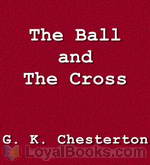 The Ball and the Cross
The Ball and the Cross
The Ball and the Cross is G. K. Chesterton's third novel. In the introduction Martin Gardner notes that it is a "mixture of fantasy, farce and theology." Gardner continues: "Evan MacIan is a tall, dark-haired, blue-eyed Scottish Highlander and a devout Roman Catholic.... James Turnbull is a short, red-haired, gray-eyed Scottish Lowlander and a devout but naive atheist.... The two meet when MacIan smashes the window of the street office where Turnbull publishes an atheist journal. This act of rage occurs when MacIan sees posted on the shop's window a sheet that blasphemes the Virgin Mary, presumably implying she was an adulteress who gave birth to an illegitimate Jesus... | |
 George Bernard Shaw
George Bernard Shaw
Chesterton and Shaw were famous friends and enjoyed their arguments and discussions. Although rarely in agreement, they both maintained good-will towards and respect for each other. However, in his writing, Chesterton expressed himself very plainly on where they differed and why. In Heretics he writes of Shaw: “After belabouring a great many people for a great many years for being unprogressive, Mr. Shaw has discovered, with characteristic sense, that it is very doubtful whether any existing human being with two legs can be progressive at all... | |
 Manalive
Manalive
The flying blast struck London just where it scales the northern heights, terrace above terrace, as precipitous as Edinburgh. It was round about this place that some poet, probably drunk, looked up astonished at all those streets gone skywards, and (thinking vaguely of glaciers and roped mountaineers) gave it the name of Swiss Cottage, which it has never been able to shake off. At some stage of those heights a terrace of tall gray houses, mostly empty and almost as desolate as the Grampians, curved... | |
 The Defendant
The Defendant
A collection of reprinted articles on a wide-range of subject, all in the unique style of G. K. Chesterton. Using wit, paradox, and good humor he “defends” a series of seeming harmless things that need no defense, and in so doing he exposes many of the broken assumptions and dogmatic notions of secular humanism and other trends of his age and of ours. | |
 The Appetite of Tyranny
The Appetite of Tyranny
“Unless we are all mad, there is at the back of the most bewildering business a story: and if we are all mad, there is no such thing as madness. If I set a house on fire, it is quite true that I may illuminate many other people’s weaknesses as well as my own. It may be that the master of the house was burned because he was drunk; it may be that the mistress of the house was burned because she was stingy, and perished arguing about the expense of the fire-escape. It is, nevertheless, broadly true that they both were burned because I set fire to their house. That is the story of the thing. The mere facts of the story about the present European conflagration are quite as easy to tell.” | |
 Tremendous Trifles
Tremendous Trifles
“None of us think enough of these things on which the eye rests. But don’t let us let the eye rest. Why should the eye be so lazy? Let us exercise the eye until it learns to see startling facts that run across the landscape as plain as a painted fence. Let us be ocular athletes. Let us learn to write essays on a stray cat or a coloured cloud. I have attempted some such thing in what follows; but anyone else may do it better, if anyone else will only try. ” (Gilbert Keith Chesterton) | |
 Varied Types
Varied Types
Another delightful and sharply pointed excursion into the topics of the day, and of our day as well, with Gilbert Keith Chesterton. Here he uses his wit and mastery of paradox to bring into focus a number of historical persons who in many ways typify the people who presently shape our world and who in their own right have already shaped Western civilization. These reprinted magazine articles are filled with his good natured wit and devastating ability to use reductio ad absurdum to destroy the popular myths that drive our society at full-speed into, and expose the utter nonsense that underlies, secular humanism. You will come away with yet another new collection of wonderful quotes. | |
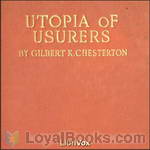 A Utopia of Usurers
A Utopia of Usurers
“Now I have said again and again (and I shall continue to say again and again on all the most inappropriate occasions) that we must hit Capitalism, and hit it hard, for the plain and definite reason that it is growing stronger. Most of the excuses which serve the capitalists as masks are, of course, the excuses of hypocrites. They lie when they claim philanthropy; they no more feel any particular love of men than Albu felt an affection for Chinamen. They lie when they say they have reached their position through their own organising ability... | |
 The Appreciations and Criticisms of the Works of Charles Dickens
The Appreciations and Criticisms of the Works of Charles Dickens
“These papers were originally published as prefaces to the separate books of Dickens in one of the most extensive of those cheap libraries of the classics which are one of the real improvements of recent times. Thus they were harmless, being diluted by, or rather drowned in Dickens. My scrap of theory was a mere dry biscuit to be taken with the grand tawny port of great English comedy; and by most people it was not taken at all–like the biscuit. Nevertheless the essays were not in intention so aimless as they appear in fact... | |
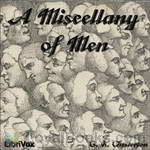 A Miscellany of Men
A Miscellany of Men
Gilbert Keith Chesterton was among the world’s most prolific writers who incorporated relentless logic, wonderful humor, and a clear view of truth into an amazing tool for exposing the foolishness of the policies of the world around him through the device of paradox.It is always great fun, and certainly always a learning experience to read Chesterton. A Miscellany of Men may be his hardest work to define, as it deals with a huge array of issues, using “personal types” as illustration. It would... | |
 The Trees of Pride
The Trees of Pride
Three trees, known as the Peacock trees, are blamed by the peasants for the fever that has killed many. Squire Vane scoffs at this legend as superstition. To prove them wrong, once and for all, he takes a bet to spend the night in the trees. In the morning he has vanished. Is he dead, and if so who has killed him? The poet? The lawyer? The woodsman? The trees? | |
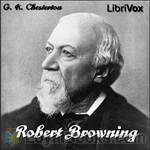 Robert Browning
Robert Browning
There is an old anecdote, probably apocryphal, which describes how a feminine admirer wrote to Browning asking him for the meaning of one of his darker poems, and received the following reply: “When that poem was written, two people knew what it meant–God and Robert Browning. And now God only knows what it means. | |
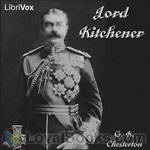 Lord Kitchener
Lord Kitchener
“The paradox of all this part of his life lies in this–that, destined as he was to be the greatest enemy of Mahomedanism, he was quite exceptionally a friend of Mahomedans.” | |
 Poems
Poems
Originally published in 1916, this book of poetry by G.K. Chesterton includes 59 poems on a variety of subjects. Included in this are war poems, love poems, religious poems, ballades and more. | |
By: Louisa May Alcott (1832-1888) | |
|---|---|
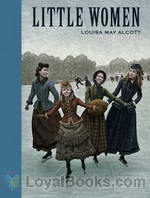 Little Women
Little Women
Set in nineteenth century New England, Little Women follows the lives of the four March sisters-Jo, Beth, Amy and Meg. The novel is a classic rites of passage story, that has often split literature critics but has been adored by many over the years. Intended as a book for young girls, the book is too sentimental for some but plenty of adults and young men have Little Women firmly featured in their best books of all time. The pace of the novel can be slow at times and the language almost too perfect but the overall sympathetic tone of Alcott wins over the reader... | |
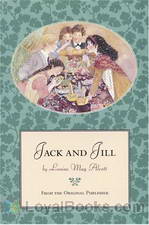 Jack and Jill
Jack and Jill
Louisa May Alcott, more famously known for her Little Women series, takes a familiar nursery rhyme and creates a whole novel out of it in one of her last books Jack and Jill: A Village Story. Though she continued to publish under the penname AM Barnard, this book probably marked the end of a particular writing phase in 1880. Jack and Jill is set in the fictional Harmony Village. On a December afternoon, the youngsters of the village are out enjoying the bracing cold and snow. The bright winter shines down as they have fun skating and sledding... | |
 Little Men
Little Men
If you've read and loved Little Women, you'd probably enjoy finding out more about the doings of the sisters in the third book in the series, Little Men. Published in 1871, the book's full title was Little Men or Life at Plumfield with Jo's Boys. It followed the success of Little Women in 1868 and Good Wives in 1869, which portrayed the fortunes of the March family. Filled with remarkable, endearing and memorable characters, the books remain as fresh and enjoyable as they were when they first came out more than a century ago... | |
 The Abbots Ghost or Maurice Treherne Temptation
The Abbots Ghost or Maurice Treherne Temptation
Louisa May Alcott enthusiasts would be delighted to read this short novel published in 1867, just a year before the grand debut of her most famous Little Women trilogy. This is one of three books she wrote under the pseudonym AM Barnard. She used this name to pen tales that were meant more for adult readers, though younger people will find them quite interesting too. The Abbot's Ghost or Maurice Treherne's Temptation is a romance, mystery, ghost-story and novel of manners all rolled into one... | |
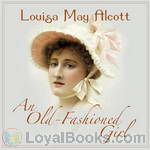 An Old-Fashioned Girl
An Old-Fashioned Girl
Polly Milton, a 14-year-old country girl, visits her friend Fanny Shaw and her wealthy family in the city for the first time. Poor Polly is overwhelmed by the splendor at the Shaws’ and their urbanized, fashionable lifestyles, fancy clothes and some other habits she considers weird and, mostly, unlikable. However, Polly’s warmth, support and kindness eventually win her the hearts of all the family members. Six years later, Polly comes back to the city to become a music teacher. | |
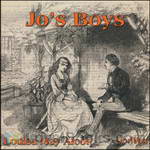 Jo's Boys
Jo's Boys
Jo’s Boys is the third book in the Little Women trilogy by Louisa May Alcott, published in 1886. In it, Jo’s “children”, now grown, are caught up in real world troubles. All three books – although fiction – are highly autobiographical and describe characters that were really in Alcott’s life. This book contains romance as the childhood playmates become flirtatious young men and women. The characters are growing up, going out into the world and deciding their futures. | |
 Hospital Sketches
Hospital Sketches
Alcott in 1862 served as a nurse in Georgetown, D.C during the Civil War. She wrote home what she observed there. Those harrowing and sometimes humorous letters compiled make up Hospital Sketches. | |
 A Garland For Girls
A Garland For Girls
“These stories were written for my own amusement during a period of enforced seclusion. The flowers which were my solace and pleasure suggested titles for the tales and gave an interest to the work. If my girls find a little beauty or sunshine in these common blossoms, their old friend will not have made her Garland in vain.” – L.M. Alcott, September, 1887 | |
 Rose in Bloom
Rose in Bloom
Opening several years after the close of "Eight Cousins", we find Rose coming home fresh from a voyage overseas, to find much changed about her. Now of a marriageable age and heiress to a fortune, Rose finds joy,sorrow, and finally love await her -- as the Rose is finally ready to bloom into a good, strong, sweet and true woman.This sequel to Eight Cousins was written by Louisa May Alcott, the author of many well beloved children's books including Little Women, An Old Fashioned Girl, Under the Lilacs and more. | |
 Under the Lilacs
Under the Lilacs
"When two young girls decide to have a tea party with their dolls and a mysterious dog comes and eats their prized cake, they end up finding a circus run-away, Ben Brown. Ben is a horse master, and loves horses, so when the Moss' take the young boy in, they decide to give him work at the neighbors house driving cows (on a horse, of course). After that a series of events happens, and Ben finds out his beloved father is dead. Miss Celia, a neighbor, feels sorry and comforts him, and finally offers to let Ben stay with her and her fourteen-year-old brother, Thornton who is called Thorny... | |
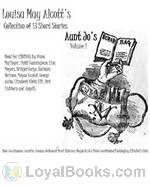 Aunt Jo's Scrapbag
Aunt Jo's Scrapbag
A collection of short stories by Louisa May Alcott that were written with the intent to entertain the whole family and to fill children's heads with wonder and delight. | |
 Work: A Story of Experience
Work: A Story of Experience
It is one of “several nineteenth-century novels [which] uncovers the changes in women’s work in the new industrial era, as well as the dilemmas, tensions, and the meaning of that work” The story depicts the struggles of a young woman trying to support herself. The main character, Christie Devon, works outside the home in a variety of different jobs, but the end of her story marks “the beginning of a new career as a voice and activist for other working women”. | |
 Flower Fables
Flower Fables
Flower Fables is Louisa May Alcott’s first book, penned at 16 for Ralph Waldo Emerson’s daughter, Ellen. | |
 The Mysterious Key and What It Opened
The Mysterious Key and What It Opened
In this delightful short story, we discover the secrets of the Trevlyn family. 'The Mysterious Key and What it Opened' is a mystery entwined with romance (Introduction by ashleighjane) | |
 Comic Tragedies
Comic Tragedies
Fans of Louisa May Alcott's Little Women will remember the elaborate plays which the March sisters loved to perform. This volume, published after Alcott's death, is a compilation of the real plays written by her and her sisters, which were fictionalized in Little Women. | |
 Behind a Mask, or a Woman's Power
Behind a Mask, or a Woman's Power
Fans of Louisa May Alcott's Little Women will remember that her heroine Jo wrote racy novels before turning her hand to more "serious" literature. Alcott, writing under the pseudonym A. M. Barnard, often did the same, and Behind a Mask (1866) is one of her sensation novels. It focuses on Jean Muir, who enters the home of the wealthy Coventry family as governess to their sixteen-year-old daughter. But is the beguiling Miss Muir all that she seems to be? (Introduction by Elizabeth Klett) | |
 A Modern Cinderella Or, the Little Old Shoe and Other Stories
A Modern Cinderella Or, the Little Old Shoe and Other Stories
| |
 Kitty's Class Day and Other Stories
Kitty's Class Day and Other Stories
| |
 The Louisa Alcott Reader: a Supplementary Reader for the Fourth Year of School
The Louisa Alcott Reader: a Supplementary Reader for the Fourth Year of School
| |
 Shawl-Straps: A Second Series of Aunt Jo's Scrap-Bag
Shawl-Straps: A Second Series of Aunt Jo's Scrap-Bag
| |
 The Candy Country
The Candy Country
| |
 Silver Pitchers: and Independence A Centennial Love Story
Silver Pitchers: and Independence A Centennial Love Story
| |